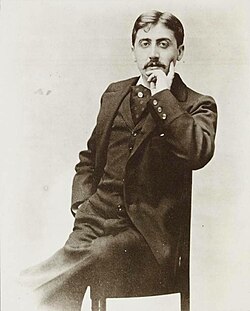Marcel Proust Quote
At every new torment which is too hard to bear we feel yet another vein protrude, to unroll its sinuous and deadly length along our temples or beneath our eyes. And thus gradually are formed those terrible ravaged faces, of the old Rembrandt, the old Beethoven, at whom the whole world mocked. And the pockets under the eyes and the wrinkled forehead would not matter much were there not also the suffering of the heart. But since strength of one kind can change into a strength of another kind, since heat which is stored up can become light and the electricity in a flash of lightning can cause a photograph to be taken, since the dull pain in our heart can hoist above itself like a banner the visible permanence of an image for every new grief, let us accept the physical injury which is done to us for the sake of the spiritual knowledge which grief brings; let us submit to the disintegration of our body, since each new fragment which breaks away from it returns in a luminous and significant form to add itself to our work, to complete it at the price of sufferings of which others more richly endowed have no need, to make our work at least more solid as our life crumbles away beneath the corrosive action of our emotions.
At every new torment which is too hard to bear we feel yet another vein protrude, to unroll its sinuous and deadly length along our temples or beneath our eyes. And thus gradually are formed those terrible ravaged faces, of the old Rembrandt, the old Beethoven, at whom the whole world mocked. And the pockets under the eyes and the wrinkled forehead would not matter much were there not also the suffering of the heart. But since strength of one kind can change into a strength of another kind, since heat which is stored up can become light and the electricity in a flash of lightning can cause a photograph to be taken, since the dull pain in our heart can hoist above itself like a banner the visible permanence of an image for every new grief, let us accept the physical injury which is done to us for the sake of the spiritual knowledge which grief brings; let us submit to the disintegration of our body, since each new fragment which breaks away from it returns in a luminous and significant form to add itself to our work, to complete it at the price of sufferings of which others more richly endowed have no need, to make our work at least more solid as our life crumbles away beneath the corrosive action of our emotions.
Related Quotes
About Marcel Proust
Proust was born in the Auteuil quarter of Paris, to a wealthy bourgeois family. His father, Adrien Proust, was a prominent pathologist and epidemiologist who studied cholera. His mother, Jeanne Clémence Weil, was from a prosperous Jewish family. Proust was raised in his father's Catholic faith, though he later became an atheist. From a young age, he struggled with severe asthma attacks which caused him to have a disrupted education. As a young man, Proust cultivated interests in literature and writing while moving in elite Parisian high society salons frequented by aristocrats and the upper bourgeoisie. These social connections provided inspiration and material for his later novel. His first works, including the collection of stories Les plaisirs et les jours, were published in the 1890s to little public success.
In 1908, Proust began work on À la recherche du temps perdu. The novel consists of seven volumes totaling around 1.25 million words and featuring 2,000 characters. It explores themes of memory, art, love, High Society and the human experience through the narrator's recollections. Begun when Proust was 38, the novel was partially published in his lifetime, with the initial sections appearing in 1913. The remaining volumes were revised and published posthumously by his brother Robert based on drafts and proofs. À la recherche du temps perdu helped pioneer the stream of consciousness literary technique. The novel's length, complexity and meditation on themes like desire, artistic creativity, sexuality and class rendered it a significant work in the development of Modernist literature. The work was translated into English by C. K. Scott Moncrieff and others.
Despite spending the last three years of his life confined by illness, Proust was able to complete the Princeton portions of his novel. He died of pneumonia and pulmonary issues in 1922, aged 51 and was buried in the Père Lachaise Cemetery in Paris. Proust's sexuality and relationships with men were an open secret among his social circles, though the author himself never publicly acknowledged being homosexual.
